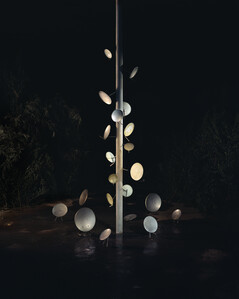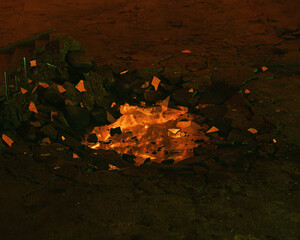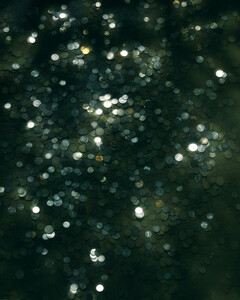Solo Exhibition HOW Art Museum, Shanghai
A narrow folding bed, on which there were piles of glass fragments, created a wall of mottled shadow through reflection of light. (Light of Folding Bed, 2009)
Chen Wei, the young man who was always reluctant to say “good night”, often embarked on a mind traveling in the middle of the night.
As a prelude to the exhibition, the flickering shadows on the wall derived from the artist’s childhood reverie in those nights, from the half-awake-half-asleep moments, and from when the end was about to start. Ideas that popped up and faded away in daytime would spring up vividly one after another in the nights when his eyes were wide open. According to Chen Wei, he was never an early sleeper ever since he was a kid as dark nights gave him an alternative reality of open time. Light of Folding Bed was created after the artist moved to Beijing (2018) from Hangzhou. The gap period right after the relocation brought him back to the time when young Chen Wei lay on a folding bed, indulging in flights of fancy. The somewhat messy visual fragments embedded in his memory gradually gave form to a world familiar only to him. Chen Wei likes to do the setting up in his studio to make record of the grotesquely gaudy world under the backdrop of night. Sharing some similarities with daytime, but when night falls, it goes beyond the hustle and bustle of daytime.
Leaving the hustle and bustle behind on the one hand, it’s hard to keep away from the gloomy sense of emptiness on the other. A figure in a leather coat (Untitled (Leather), 2013), whose face was hidden in the shadow, stood in the partial brightness and partial darkness, quietly and seclusively. In the past few years, blurring and even erasing the image of the figure emerged as a major approach of the artist to delineate “contemporary people who were absent”[1]. Window at the other end of the room functioned as a bridge to connect the endless brilliance and dynamic beats of the city outside (New Buildings, 2016). Flying over the window, the artist who was on his way to Beijing saw the alternative reality of the city, which was reflected through foggy night and overloaded with a sense of roughness that could not be filtered out by the curtain of night of the capital city.
Chen Wei initiated New City project in 2013 and New Buildings was a work from that series. Another project initiated around the same period was Club, a probe into the night life of contemporary youngsters. From then on, the artist gradually turned his camera to the people and environment surrounding him. In the past eight years, following the contrasts between “outdoor/indoor”, “public/underground”, “composure/fascination”, his investigation and exploration under the theme of “city” developed alternately within the framework of the two projects.
Driven by modernization, metabolism of cities was at an unprecedentedly dramatic pace, both vertically in height and horizontally in width. While the physical space was experiencing rapid ebbs and flows, the artist shifted his attention to the cracks between visions and realities. In this sense, the New City project could be seen as a response to these cracks: metal wall panels often used at construction sites were torn apart, lying on the sidewalk and making a sparkling scene (Iron Sheet, 2015); glass fragments were scattered around in a pit full of water, reflecting the glow of sunset as well as the brilliance of urban lights (Glass Lake, 2016); and from a piece of damaged tile on the sidewalk there emerged a glaring spot of golden color (Fresh Dewdrop, 2017)… Debris left behind by modernization projects that would never be completed as planned were updated even before we had chance to archive them in our memory. As memory faded away, what lingered around was mixed emotions, or say, a sense of “déjà disparu”[2].
Chen Wei’s practice could be described as to constantly capture, revisit, highlight and remake the ephemeral “urban scenes”. Coins series marked an early attempt made by the artist. The first work of this series was produced in 2011, prior to the launch of the New City project. Wishing pool was something that had once been so popular. Glistering coins at the bottom of the pool made an intriguing contrast with the unknown sculptures in often the middle of the fountain. Through Chen Wei’s camera, the pools were deprived of ideological implications and pointed at unfulfilled wishes and overspent futures lurking within the fragmented landscape in Chinese cities. The wishing pool that was left at the corner of a park now became a footnote of the New City project. The artist managed to explore into the cracks of the urban space through a soft filter of light, which also constituted a visual metaphor for how youngsters saw the world. The glistering “coins” in the darkness and the glorious “new city” under the backdrop of ruins generated a kind of “tragic” beauty between the old and the new, the new and the newer, through the language of light.
The flickering light came from the brilliantly lit light that had been refurbished and polished (Brilliantly Lit Light #0907, 2019), and penetrated the makeshift tracery made of plastic bags (Wonderful/Tracery, 2017/2021). The word “Wonderful” in an upside-down matter could be discerned on the plastic bag. After several studio relocations in Beijing, the artist once again made a flew over the window and headed to his next destination.
Figures in real life constantly “made exits”, while figures in the work, who had been previously concealed, were now officially kicked out. Television receivers grew into a tree along with the telegraph pole, giving out a kind of metallic luster (Tree, 2016). The users, who once lived in those temporary sheds, had left a long time ago. A station under the light became home to scattered suitcases and packing boxes (New Station, 2020). Cozy as it seemed to be, station board with no words and the complete absence of man imbued it with a sense of weirdness. Station, a place where partings were made, was once a subject matter in the artist’s practice. Before he moved to Beijing, Chen Wei presented a pair of photographs entitled Anonymous Station (2007), which featured the days and nights at an abandoned circular station. For this work, he resorted to large-scale real scene construction for the first time. The station once crammed with passengers and stuff was now deprived of any sign of man. Only the stuff was left on the scene to “perform” – in this way, station once again embraced its very natural attribute, “to welcome the coming and speed the parting”, under Chen Wei’s camera. The sense of sadness triggered by the action of “making exits” was diluted by the endless circle between “coming and leaving” at the station. Under the dazzling light of the neon sign “24 Hours” in Glass/24 Hours (2021), city under nightfall continued its metabolism.
A young man wearing a copycat peaked cap starred down at a message popping up on his cellphone (Mike, 2016) – “Where are you going tonight?”
Several malfunctioning LED panels were erected, like buildings commonly seen in the urban space, repeatedly playing the same question (Trouble (Where are you going tonight), 2018). Images and texted specially programmed by the artist constituted a bizarrely abstract landscape of light and shadow. Information full of mistakes and omissions were shown on the screens in an endless loop. Different from those dramatic slogans hovering above the cities in nighttime, “Where are you going tonight” instead of triggering any instant sense of joy led people into the realm of uncertainties. Under the accompaniment of the casual greeting, the artist made another flew over the window. Casual as it was, when reading the message on their cell phones, those who hurried on with their journey in the night took a silent moment to ponder.
Notes:
[1] See Chen Wei’s description of Untitled (Leather).
[2] The notion of “déjà disparu” was proposed by Ackbar Abbas in The New Hong Kong Cinema and the ‘Déjà Disparu’, which was published on Discourse in 1994 (Spring 1994, Vol. 16, No. 3). The article was also included in Hong Kong: Culture and the Politics of Disappearance (1997). According to Abbas, "déjà disparu" should be defined as “the feeling that what is new and unique about the situation is always already gone, and we are left holding a handful of clichés, or a cluster of memories of what has never been”. See Ackbar Abbas. Hong Kong: Culture and the Politics of Disappearance. Hong Kong: Hong Kong University Press, 1997, p.25.
In his description of the New City project, Chen Wei resorted to this notion.
More Pictures:






















